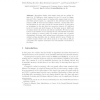Free Online Productivity Tools
i2Speak
i2Symbol
i2OCR
iTex2Img
iWeb2Print
iWeb2Shot
i2Type
iPdf2Split
iPdf2Merge
i2Bopomofo
i2Arabic
i2Style
i2Image
i2PDF
iLatex2Rtf
Sci2ools
129
click to vote
WADS
2009
Springer
2009
Springer
Fault Tolerant External Memory Algorithms
Abstract. Algorithms dealing with massive data sets are usually designed for I/O-efficiency, often captured by the I/O model by Aggarwal and Vitter. Another aspect of dealing with massive data is how to deal with memory faults, e.g. captured by the adversary based faulty memory RAM by Finocchi and Italiano. However, current fault tolerant algorithms do not scale beyond the internal memory. In this paper we investigate for the first time the connection between I/O-efficiency in the I/O model and fault tolerance in the faulty memory RAM, and we assume that both memory and disk are unreliable. We show a lower bound on the number of I/Os required for any deterministic dictionary that is resilient to memory faults. We design a static and a dynamic deterministic dictionary with optimal query performance as well as an optimal sorting algorithm and an optimal priority queue. Finally, we consider scenarios where only cells in memory or only cells on disk are corruptible and separate randomized...
Related Content
| Added | 25 May 2010 |
| Updated | 25 May 2010 |
| Type | Conference |
| Year | 2009 |
| Where | WADS |
| Authors | Gerth Stølting Brodal, Allan Grønlund Jørgensen, Thomas Mølhave |
Comments (0)

